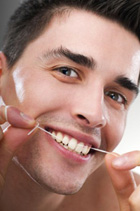 Dental pain, ranging from continuous dull throbbing to sharp intense stabbing sensations, is notoriously unpleasant. The reason why dental pain stands out from other types of pain is that it usually stems from the dental nerve which can be very exposed if the tooth is affected by decay.
Dental pain, ranging from continuous dull throbbing to sharp intense stabbing sensations, is notoriously unpleasant. The reason why dental pain stands out from other types of pain is that it usually stems from the dental nerve which can be very exposed if the tooth is affected by decay.
Dental pain is commonly known as toothache which can be misleading because in reality all parts of the teeth, nerve structure and soft tissue can cause painful sensations. At the lower end of the scale is pain caused by sensitive teeth. This is when enamel has thinned or eroded leaving the dentine and tooth root slightly more exposed to extremes of hot and cold from food, and even simply breathing in. The extreme of temperature sends a stimulus to the nerve that passes through the dentine that causes the pain. Sensitive teeth can be treated in several different ways that include using more effective toothpastes and cleaning methods but in more serious cases teeth may need a filling or crown to provide an extra layer of protection against pain.
More serious dull or sharp pain can be caused by infection of the tooth or gum. When a dental cavity exposes the sensitive central part of the tooth it can sometimes become infected with the bacterial matter that lives in the mouth. This bacterial infection attacks the root of the tooth containing the dental nerve, which can be extremely painful. This can also lead to painful dental abscesses as the body attempts to fight back by producing more white blood cells. This builds up in pockets around the teeth causing very nasty and painful abscesses.
Most dental pain will respond to over-the-counter treatment with painkillers but in all cases it is important that you make an appointment to see a Leeds dentist as soon as possible, even if the pain appear to have disappeared naturally. This could be the result of an infection destroying a nerve causing a temporary end to the pain but the infection may still spread to other parts of the mouth.





 Dental veneers, which are sometimes known as porcelain veneers or laminates, are very thin tooth-coloured shells that are cemented over the top of discoloured, worn or otherwise damaged teeth. They are bonded to the existing surface of the teeth using composite resin, which is tooth coloured itself and also adds another layer of protection.
Dental veneers, which are sometimes known as porcelain veneers or laminates, are very thin tooth-coloured shells that are cemented over the top of discoloured, worn or otherwise damaged teeth. They are bonded to the existing surface of the teeth using composite resin, which is tooth coloured itself and also adds another layer of protection. Teeth straightening is the process of realigning teeth using orthodontic straightening devices, more commonly known as braces. Everyone is probably familiar with braces as they have become incredibly popular over the last two decades, as it became more important to have straighter teeth.
Teeth straightening is the process of realigning teeth using orthodontic straightening devices, more commonly known as braces. Everyone is probably familiar with braces as they have become incredibly popular over the last two decades, as it became more important to have straighter teeth. Digital x-rays are the latest advancement in what has proven to be one of mankind’s greatest discoveries. The x-ray made possible medical treatments that could only have barely been conceived of prior to its discovery, and the latest developments in technology are opening up doors for further astonishing treatment.
Digital x-rays are the latest advancement in what has proven to be one of mankind’s greatest discoveries. The x-ray made possible medical treatments that could only have barely been conceived of prior to its discovery, and the latest developments in technology are opening up doors for further astonishing treatment. Discretion is one of the key factors when it comes to choosing a straightening brace for your teeth. Unlike the old fashioned fixed metal braces, modern day orthodontic treatments are much less obvious and still just as efficient. One of the most popular braces on the market is the Invisalign brace because it offers straighter teeth with almost completely invisible braces.
Discretion is one of the key factors when it comes to choosing a straightening brace for your teeth. Unlike the old fashioned fixed metal braces, modern day orthodontic treatments are much less obvious and still just as efficient. One of the most popular braces on the market is the Invisalign brace because it offers straighter teeth with almost completely invisible braces. Like all phobias, dental phobia can cause a person to completely avoid the stimulus. If you happen to have a phobia of spiders then you are unlikely to suffer health consequences as a result, but avoiding the dentist for years or even a whole lifetime can have any number of serious health effects. With the growing evidence of the links between heart disease and gum disease, it is more important than ever to receive the necessary dental treatment no matter how much it frightens you.
Like all phobias, dental phobia can cause a person to completely avoid the stimulus. If you happen to have a phobia of spiders then you are unlikely to suffer health consequences as a result, but avoiding the dentist for years or even a whole lifetime can have any number of serious health effects. With the growing evidence of the links between heart disease and gum disease, it is more important than ever to receive the necessary dental treatment no matter how much it frightens you. Few dental procedures are as feared as the root canal treatment but this may be a little unfair to a treatment that can signal an end to enormous amounts of pain. When infections occur in the teeth as a result of decay, it may be that initially you feel little or no pain, but as it worsens it can lead to very painful abscesses and even the complete destruction of the dental nerve. In these circumstances, if a root canal procedure is not carried out it may result in the loss of the tooth altogether.
Few dental procedures are as feared as the root canal treatment but this may be a little unfair to a treatment that can signal an end to enormous amounts of pain. When infections occur in the teeth as a result of decay, it may be that initially you feel little or no pain, but as it worsens it can lead to very painful abscesses and even the complete destruction of the dental nerve. In these circumstances, if a root canal procedure is not carried out it may result in the loss of the tooth altogether. It is now possible to straighten teeth and create a beautiful smile in as little as six months. Using the old style fixed metal braces, straightening could take up to three years but as technology has improved, so has treatment time for orthodontic braces.
It is now possible to straighten teeth and create a beautiful smile in as little as six months. Using the old style fixed metal braces, straightening could take up to three years but as technology has improved, so has treatment time for orthodontic braces. The structure of a tooth has three distinct layers. On the outside is the hard enamel that protects the more sensitive inside layers of the tooth. Directly inside the enamel is the dentine which is a slightly softer material that surrounds the dental nerve in the centre. If the outer protective enamel layer is damaged either through decay or as the result of an accident it can become necessary to provide the tooth with an extra layer of protection. This usually comes in the form of a tooth shaped and coloured dental crown that is fixed over the top of the damaged tooth.
The structure of a tooth has three distinct layers. On the outside is the hard enamel that protects the more sensitive inside layers of the tooth. Directly inside the enamel is the dentine which is a slightly softer material that surrounds the dental nerve in the centre. If the outer protective enamel layer is damaged either through decay or as the result of an accident it can become necessary to provide the tooth with an extra layer of protection. This usually comes in the form of a tooth shaped and coloured dental crown that is fixed over the top of the damaged tooth. The purpose of brushing and flossing is to reduce the number of bacteria in the mouth that feed on food particles left over from eating. Bacteria feast on this food debris producing acids which cause damage to the enamel of the teeth, breaking it down and attacking the sensitive centre of the tooth. As if this wasn’t bad enough, bacteria and decaying food matter also cause over 90 per cent of cases of bad breath.
The purpose of brushing and flossing is to reduce the number of bacteria in the mouth that feed on food particles left over from eating. Bacteria feast on this food debris producing acids which cause damage to the enamel of the teeth, breaking it down and attacking the sensitive centre of the tooth. As if this wasn’t bad enough, bacteria and decaying food matter also cause over 90 per cent of cases of bad breath.

